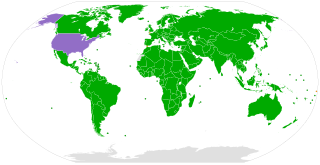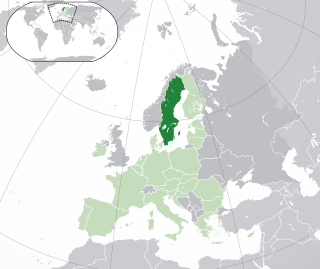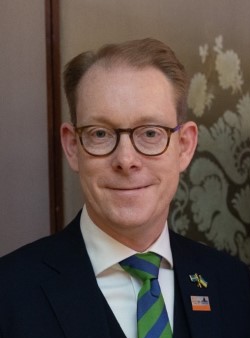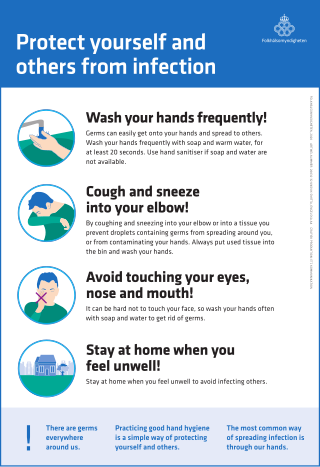Related Research Articles

The United Nations Convention on the Rights of the Child is an international human rights treaty which sets out the civil, political, economic, social, health and cultural rights of children. The convention defines a child as any human being under the age of eighteen, unless the age of majority is attained earlier under national legislation.

The politics of Sweden take place in a framework of a parliamentary representative democratic constitutional monarchy. Executive power is exercised by the government, led by the prime minister of Sweden. Legislative power is vested in both the government and parliament, elected within a multi-party system. The judiciary is independent, appointed by the government and employed until retirement. Sweden is formally a monarchy with a monarch holding symbolic power.

The Basic Laws of Sweden are the four constitutional laws of the Kingdom of Sweden that regulate the Swedish political system, acting in a similar manner to the constitutions of most countries.

The prime ministerof Sweden is the head of government of Sweden. The prime minister and their cabinet exercise executive authority in the Kingdom of Sweden and are subject to the Parliament of Sweden. The prime minister is nominated by the speaker of the Riksdag and is elected by the chamber by simple majority, using negative parliamentarianism. The Riksdag holds elections every four years, in the even year between leap years.

The National Defence Radio Establishment is a Swedish government agency organised under the Ministry of Defence. The two main tasks of FRA are signals intelligence (SIGINT), and support to government authorities and state-owned companies regarding computer security.

Ulf Hjalmar Kristersson is a Swedish politician who has been serving as Prime Minister of Sweden since 2022. He has been the leader of the Moderate Party (M) since October 2017 and a member of the Riksdag (MP) for Södermanland County since 2014 and for Stockholm County from 1991 to 2000. He previously served as Minister for Social Security from 2010 to 2014 and as Chairman of the Moderate Youth League from 1988 to 1992.
Parliamentary Ombudsman is the name of the principal ombudsman institutions in Finland, Iceland, Denmark, Norway, and Sweden. In each case, the terms refer both to the office of the parliamentary ombudsman and to an individual ombudsman.

Lesbian, gay, bisexual, and transgender (LGBT) rights in Sweden are regarded as some of the most progressive in Europe and the world. Same-sex sexual activity was legalized in 1944 and the age of consent was equalized to that of heterosexual activity in 1972. Sweden also became the first country in the world to allow transgender people to change their legal gender post-sex reassignment surgery in 1972, whilst transvestism was declassified as an illness in 2009. Legislation allowing legal gender changes without hormone replacement therapy and sex reassignment surgery was passed in 2013.
Same-sex marriage has been legal in Sweden since 1 May 2009 following the adoption of a gender-neutral marriage law by the Riksdag on 1 April 2009. Sweden was the second Scandinavian country, the fifth in Europe and the seventh in the world to open marriage to same-sex couples nationwide. Existing registered partnerships remain in force and can be converted to a marriage if the partners so desire, either through a written application or through a formal ceremony. New registered partnerships are no longer able to be entered into and marriage is now the only legally recognized form of union for couples regardless of sex.

Tobias Lennart Billström is a Swedish politician of the Moderate Party. He has served as Minister for Foreign Affairs in the cabinet of Ulf Kristersson since 18 October 2022 and has been Member of the Riksdag since the 2002 general election, representing Malmö Municipality (2002–2022) and Stockholm County.

The Ministry of Health and Social Affairs is a ministry in the Government of Sweden responsible for policies related to social welfare: social security, social services, medical and health care, public health and the rights of children, the elderly and disabled people.

The Ministry of Employment is a ministry in the Swedish government responsible for labour market, labour law and the work environment. The Ministry is also responsible for the work of advancing gender equality and human rights at national level. Moreover, the Ministry is responsible for efforts to increase integration, combat segregation, racism and discrimination, and strengthen the rights of children and LGBT people.
Ministerial rule is the informal term for when a public authority in Sweden — including the Riksdag, or a decision-making body of a municipality — tries to influence how an administrative authority decides in a particular case relating to the exercise of public authority vis-à-vis an individual or a local authority, or the application of legislation. This is a violation against the Instrument of Government, the main part of the constitution of Sweden.

An ombudsman, ombud, ombuds, bud, ombudswoman, ombudsperson or public advocate is a government employee who investigates and tries to resolve complaints, usually through recommendations or mediation. They are usually appointed by the government or by parliament.
The Republic of Vanuatu is a parliamentary democracy with a population of approximately 326.000. The Constitution of Vanuatu is supreme law and sets out the legal framework which deals with the respect of human rights.
A children's ombudsman, children's commissioner, youth commissioner, child advocate, children's commission, youth ombudsman or equivalent body is a public authority in various countries charged with the protection and promotion of the rights of children and young people, either in society at large, or in specific categories such as children in contact with the care system. The agencies usually have a substantial degree of independence from the executive, the term is often used differently from the original meaning of ombudsman, it is often an umbrella term, often used as a translation convention or national human rights institutions, dealing with individual complaints, intervening with other public authorities, conducting research, and – where their mandate permits them to engage in advocacy – generally promoting children's rights in public policy, law and practice. The first children's commissioner was established in Norway in 1981. The creation of such institutions has been promoted by the United Nations Committee on the Rights of the Child, and, from 1990 onwards, by the Council of Europe.
The Government of the Kingdom of Sweden is the national cabinet of Sweden, and the country's executive authority.

Juno Maria Petra Blom is a Swedish civil servant and former politician who has served as Ombudsman for Children in Sweden since 1 March 2024.

Sweden's unique response to the COVID-19 pandemic has been the subject of significant controversy in both domestic and international circles. Unlike most countries, which strongly recommended or introduced widespread sector closures, quarantining, and lockdown measures to curb the spread of the coronavirus disease 2019, the government of Sweden took a more lenient approach to the pandemic, prioritizing the economy and only pursuing social distancing measures such as bans on large gatherings and limited travel restrictions.
Honor-related violence in Sweden first received public attention in Sweden due to the honor killings of Sara Abed Ali in 1996, Pela Atroshi in 1999 and Fadime Sahindal in 2002. Honor related violence includes forced marriage, female genital mutilation, and other forms of coercion. According to the Swedish Agency for Youth and Civil Society in 2009, about 70 thousand women and men reported pressure to marry against their will. In 2019, the Swedish Police Authority started to specifically track honor-related crimes, and by November 2021, 4500 suspected honor-related crimes had been reported.
References
- 1 2 "About us". Barnombudsmannen. Archived from the original on 18 January 2015. Retrieved 25 July 2014.
- ↑ "Regleringsbrev" (in Swedish). Ekonomistyrningsverket. Archived from the original on 18 January 2015. Retrieved 25 July 2014.
- ↑ "Lag (1993:335) om Barnombudsman" (in Swedish). The Swedish Government. Retrieved 25 July 2014.
- 1 2 "Om oss" (in Swedish). Barnombudsmannen. Retrieved 2019-07-14.
- ↑ Regeringskansliet, Regeringen och (29 February 2024). "Juno Blom ny barnombudsman". Regeringskansliet (in Swedish).